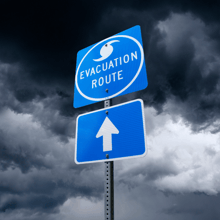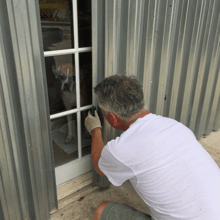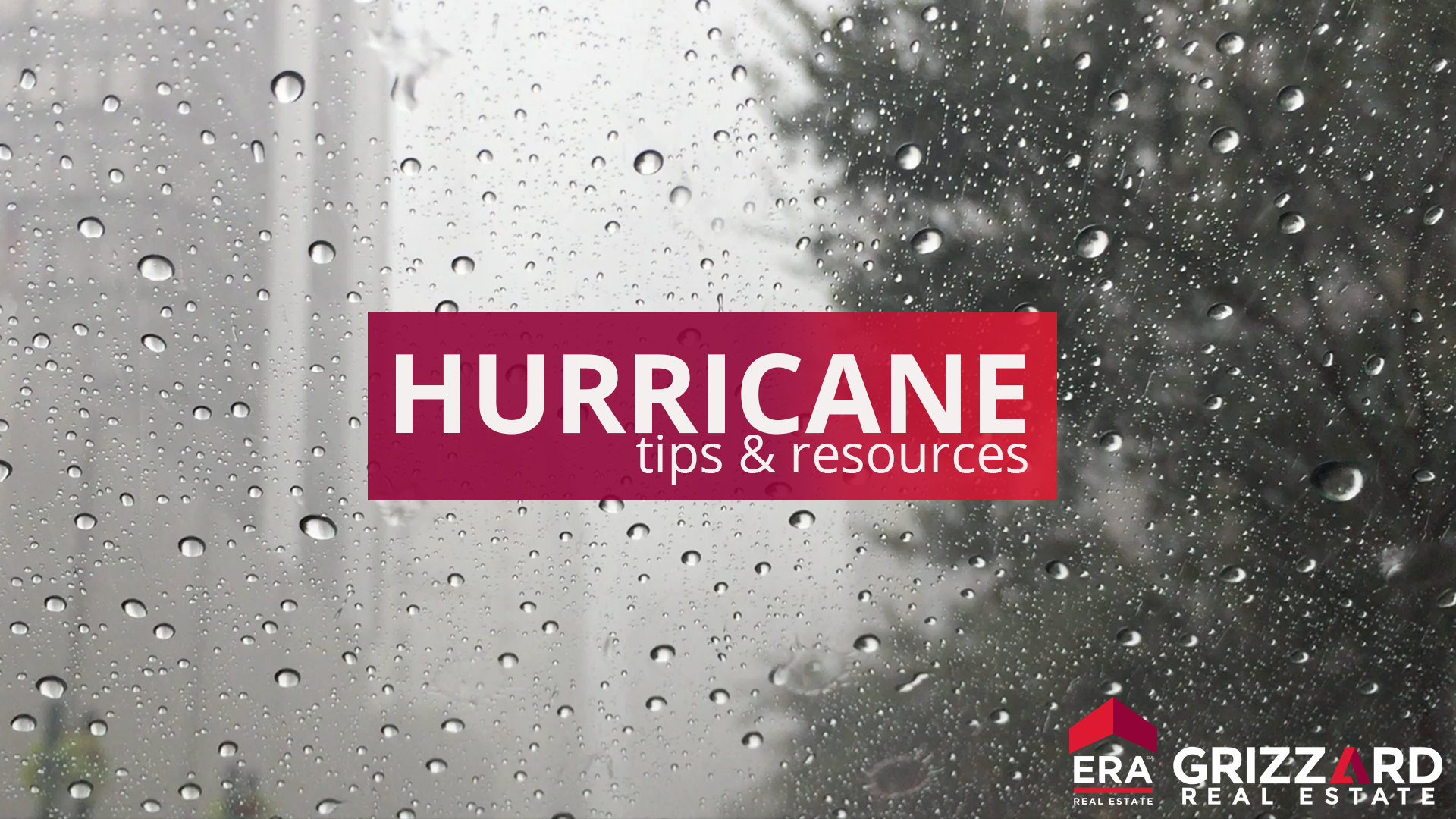.gif?width=619&name=BLOG%20DIVIDER%20%20CTA%20%20(940%20%C3%97%20300%20px).gif) It's about that time of year again to get some hurricane prepping started if you haven't already done so! Good thing for you we have everything you need to know while prepping for a hurricane with our hurricane prep list. Now let's get started!
It's about that time of year again to get some hurricane prepping started if you haven't already done so! Good thing for you we have everything you need to know while prepping for a hurricane with our hurricane prep list. Now let's get started!
Six simple steps to prepare for hurricane season
How to prep for a hurricane: follow these steps!
1.Plan your evacuation route well ahead of time.
 If you live on the coast or in a mobile home, you may have to evacuate in the event of a major storm forecast for your area. While you will undoubtedly get instructions from the local government, it's wise to create your evacuation plan well before a disaster strikes. This way, you can know ahead of time how to reach the nearest shelters quickly, take your pets into account in your plan, secure important papers, and make a trial run.
If you live on the coast or in a mobile home, you may have to evacuate in the event of a major storm forecast for your area. While you will undoubtedly get instructions from the local government, it's wise to create your evacuation plan well before a disaster strikes. This way, you can know ahead of time how to reach the nearest shelters quickly, take your pets into account in your plan, secure important papers, and make a trial run.
2. Keep a stash of emergency supplies on hand.
When a hurricane warning is issued, there’s a mad rush to local grocery and home improvement stores. Get ahead of the crowd by storing the following in a convenient place before the start of the hurricane season.
Plan to bring the supplies on this list if you need to evacuate your location. Also, consider making a note on your calendar to regularly check each item (especially food and batteries) for upcoming expiration dates and ensure they are still usable. Replenish your stash as needed.
3. Take an inventory of your personal property.
Creating a home inventory will help ensure that you have purchased enough property insurance to replace your possessions. It can also speed the claims process, substantiate losses for income tax purposes, and is helpful should you need to apply for federal or state disaster aid. Take pictures or video when possible. If you need to evacuate, be sure to include your home inventory among the important documents you take with you or store it in the cloud.
4. Review your insurance policies.
This hurricane season insurance checklist from our friends at the Insurance Information Institute can help you understand your coverage and whether or not it’s enough for your home, and if necessary, to replace your belongings.
However, a typical homeowners insurance policy doesn’t cover flood damage, so consider looking into flood insurance. If you live by the coast, you may also need a separate policy for protection against wind and wind-blown water damage. Contact your insurance professional if you have questions about what your current policy will cover or need to expand your current coverage.
5. Take steps to protect your home.
Hurricane-force winds can turn landscaping materials into missiles that can break windows and doors. Also, much of the property damage associated with hurricanes occurs after the windstorm when rain enters structures through broken windows, doors, and openings in the roof.
%20(1).gif?width=940&name=BLOG%20DIVIDER%20%20CTA%20%20(940%20%C3%97%20300%20px)%20(1).gif)
Even though making your home more protected against storm damage can be an investment, you can do it in stages:
- Replace gravel or rock landscaping materials with shredded bark, which is lighter and won't cause as much harm.
- Cut weak branches and trees that could fall on your house and keep shrubbery trimmed.

- Install storm shutters to protect your windows from breakage. Alternately, fit plywood panels to your windows, which can be nailed to window frames when a storm approaches.
- Ensure exterior doors are wind-rated to withstand strong hurricane winds and have at least three hinges and a deadbolt lock that is at least one inch long.

- Sliding glass doors should be made of tempered glass and, during a storm, covered with shutters or plywood. These doors are more vulnerable to wind damage than most other doors.
- Replace old garage doors and tracks with a door that is approved for both wind pressure and impact protection. Wind coming into your home through an opening this large poses grave problems for the rest of your home's structure—especially your roof.
- Seal outside wall openings such as vents, outdoor electrical outlets, garden hose bibs, and locations where cables or pipes go through the wall. Use a high-quality urethane-based caulk to prevent water penetration.
- If you live in a mobile home, make sure you know how to secure it against high winds, and review your mobile home insurance policy.
- If you have a boat on a trailer, know how to anchor the trailer to the ground or house—and review your boat insurance policy.
6. Take steps to protect your business
Hurricanes take a toll on businesses, too, so be prepared. If you're a Realtor, you may want to reach out to your homeowners and check in on them. If you have any homes listed for sale on the market, take extra care to assist these customers through the storm.- Contact all of your customers/pending deals and be pro-active! Reschedule any meetings or closings, pushing them out a week, and be sure to communicate any expected delays the storm may cause.
- If you have a team that depends on you, be sure to create an emergency business response and continuity plan. This precaution will help your business quickly recover after a hurricane.
- Keep contact information up-to-date for employees, customers, suppliers, and vendors, so you can check on their wellbeing and communicate the next steps for resuming normal business operations.
- Review your business insurance policies to understand what's covered, and work with your insurance professional to make any necessary adjustments.
Hurricane Prep Checklist
You probably already know when hurricane prepping you'll need water, food, a full tank of gas in your car, a flash light, and a first aid kit, but let's go into detail of exactly you'll need with our hurricane prep checklist.
The Essentials
◻︎ Flashlights & candles
◻︎ Batteries

◻︎ Blankets
◻︎ Battery operated radio/lantern
◻︎ Matches/Lighter
◻︎ Hand Sanitizer
◻︎ Generator
◻︎ Multi-tool (Swiss Army Knife)
◻︎ Cooler
◻︎ Cash
Documentation

◻︎ Insurance cards
◻︎ Medical records
◻︎ Banking information
◻︎ Credit card numbers
◻︎ Copies of social security cards, birth/marriage certificates
◻︎ Set of car, house & office keys
Pet Needs

◻︎ Collars, harnesses & leashes
◻︎ Medication
◻︎ Pet Food
◻︎ Shot records
◻︎ Recent photo of your pet
Food

◻︎ Non-perishable food items
◻︎ Water 1 gal x 3 days /person
◻︎ Manual can opener
◻︎ Canned food/Baby food
◻︎ Disposable plates, utensils and napkins
First Aid
◻︎ Bandages
◻︎ Prescription medication
◻︎ Antibiotic ointments
◻︎ Tylenol
◻︎ First Aid Kit
◻︎ Benadryl
◻︎ Hygiene products
◻︎ Bleach
◻︎ Peroxide
◻︎ Soap
◻︎ Dry Shampoo
◻︎ Bug Spray
◻︎ Sunscreen
◻︎ Thermometer
Emergency Contacts
Bonus
◻︎Check out this article on prepping your home for storms.
It's always important to hurricane prep and with our hurricane prep list there's no doubt that you'll be prepared! Stay safe!
Up Next:



.png?width=940&name=BLOG%20DIVIDER%20%20CTA%20%20(940%20%C3%97%20300%20px).png)




